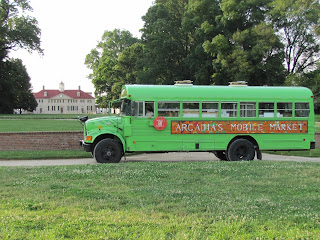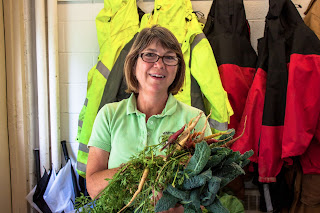 |
| JuJu and Morgan Maloney serve up some greens |
Kale and Roasted Butternut Squash Salad with
Garlicky Dressing
1 medium butternut
squash, peeled and cut into dice
1 Tablespoon dried
oregano
1 teaspoon salt
1/4 ground cinnamon
1/4 olive oil
Dressing:
3 cloves garlic,
peeled
Juice of two lemons
1/4
cup soy sauce
3 inches fresh ginger,
peeled
1/2 teaspoon black
pepper
1 cup olive oil
1 bunch fresh kale,
washed, leaves removed from stems, and cut into small pieces
Optional:
1 grated carrot
1 cup grated or
shredded red cabbage
1/2 cup dried
cranberries (craisins)
1 cup cooked garbanzo
or red beans
Preheat the oven to
350 degrees. Mix the oregano, salt,
cinnamon, and olive oil together and spread it over the squash. On an oiled cookie sheet, spread the squash
and cover tightly with foil. Bake until tender, 30 minutes. Uncover and bake for 15 minutes more, until
squash is brown.
Put all dressing
ingredients, except oil, into blender and puree. Slowly add oil with
blender running on low. Pour dressing over kale (and other optional
ingredients if using) and mix thoroughly, adding optional ingredients if
desired. Let sit for 10 minutes. Serve topped with several pieces of roasted
squash on top.





































